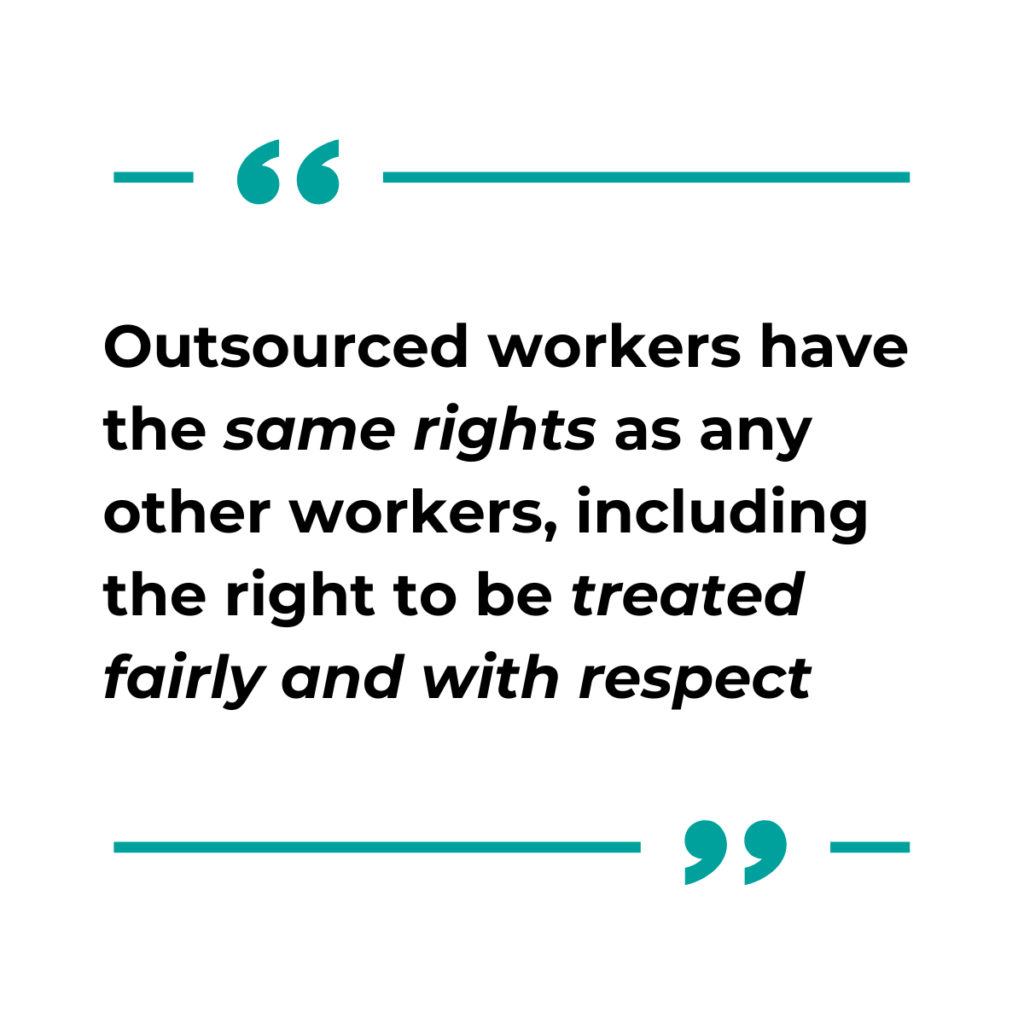By David Theuri

Choosing an outsourcing partner can be a challenging task. Aside from the administrative tasks that get transferred over to the outsourcing partner, you need to consider the treatment of your employees. The values of both companies need to align in order to get the best experience for all parties involved, especially the employees. It is also important to ensure that the general running of the company is ethical and up to code with the labour laws of the country of operation.
Sama and Meta (Facebook) – An outsourcing example
Let’s look at the example of the Sama and Meta situation that is taking place in Kenya. This is a complex case that we will comment on based on the details that are available to the public and are assumed to be correct at the time of this being published.
The Meta and Sama case is a legal battle between the outsourced employees (Sama Staff), against Sama, a company with offices in Kenya that does content moderation; and consequently Meta, the parent company of Facebook and Instagram that outsources their content moderation through Sama. The case centres on the working conditions of Sama’s content moderators, who are responsible for reviewing and removing harmful content from Meta’s platforms..
In 2022, a group of Sama moderators filed a lawsuit against Meta, alleging that the company had violated their rights by exposing them to harmful content and failing to provide adequate mental health support. The lawsuit also alleged that Meta had engaged in forced labour and human trafficking by misleading workers about the nature of the job and by bringing them to Kenya under false pretences.
Meta has denied all of the allegations in the lawsuit. The company has argued that it provides its content moderators with safe and supportive working conditions, and that it complies with all applicable Kenyan labour laws.
In March 2023, the Kenyan Employment and Labour Relations Court issued an injunction barring Meta and Sama from firing any of the content moderators who had filed the lawsuit. The court also ordered Meta to provide the moderators with mental health support.
The case is still ongoing, and it is unclear how it will be resolved. However, the case has raised important questions about the rights of content moderators and the responsibility of social media companies for the well-being of their workers. One of the key issues would be the ethics of outsourcing work to third-party vendors.
Ethical and legal considerations in outsourcing
Businesses tend to consider various factors when outsourcing work. These factors include:
- The cost of outsourcing: Outsourcing can save businesses money in the short term. However, businesses should factor in the cost of training the third-party vendor, monitoring their work, and ensuring that they are meeting the company’s standards.
- The quality of the work: The quality of the work done by the third-party vendor can vary. Businesses should carefully vet the third-party vendor and get references before outsourcing work to them.
- The risk of losing control: When you outsource work, you are giving up some control over the work process. This can be a risk if the third-party vendor does not meet your expectations.
However, there are a number of ethical and legal considerations that businesses should consider when outsourcing work to third-party vendors.
- Data privacy and security: When you outsource work, you are giving the third-party vendor access to your company’s data. This data could include sensitive information, such as customer data, financial data, and intellectual property. It is important to make sure that the third-party vendor has strong data privacy and security measures in place to protect your data.
- Intellectual property rights: When you outsource work, you are giving the third-party vendor access to your company’s intellectual property, such as patents, trademarks, and copyrights. It is important to make sure that the third-party vendor has a signed agreement that they will not use your intellectual property for their own purposes.
- Confidentiality: When you outsource work, you are sharing confidential information with the third-party vendor. This information could include trade secrets, financial information, and customer data. It is important to make sure that the third-party vendor has a signed agreement that they will keep this information confidential.
- Compliance with laws and regulations: The third-party vendor may be located in a different country with different laws and regulations. It is important to make sure that the third-party vendor is complying with all applicable laws and regulations.
- Ethical treatment of workers: The third-party vendor may employ workers in different countries. It is important to make sure that the third-party vendor is treating its workers ethically. This includes ensuring that they are paid a fair wage, working in safe conditions, and not being subjected to discrimination or abuse.
The importance of ethical treatment of workers
The ethical treatment of outsourced workers is important for a number of reasons.

- It is the right thing to do: Outsourced workers have the same rights as any other workers, including the right to be treated fairly and with respect. They should be paid a fair wage, working in safe conditions, and not be subjected to discrimination or abuse.
- It is good for business: Businesses that treat their outsourced workers ethically are more likely to have a motivated and productive workforce. This can lead to increased profits and a better reputation for the company.
- It is good for society: When outsourced workers are treated ethically, they are more likely to be able to contribute to their communities and the economy. This can help to create a more just and prosperous society for everyone.
Here are some specific benefits of ethical treatment of outsourced workers:
- Increased productivity: Outsourced workers who are treated fairly and with respect are more likely to be happy and motivated in their work. This can lead to increased productivity and efficiency.
- Reduced turnover: Outsourced workers who are treated well are less likely to leave their jobs. This can save businesses the cost of recruiting and training new employees.
- Improved morale: Outsourced workers who are treated ethically are more likely to have a positive attitude towards their work and their employer. This can lead to a more positive work environment for everyone.
- Enhanced reputation: Businesses that are known for treating their outsourced workers ethically have a positive reputation with customers, investors, and the community. This can lead to increased sales and investment.
In addition to these benefits, ethical treatment of outsourced workers can also help to promote a more just and equitable global economy. When businesses treat their outsourced workers fairly, it helps to level the playing field and create a more level playing field for workers everywhere.
So what can we learn from this?
There are a number of things that businesses can do to ensure the ethical treatment of outsourced workers. These include:
- Conducting due diligence: Before outsourcing work, businesses should conduct due diligence on the third-party vendor to ensure that they are compliant with all applicable laws and regulations and that they treat their workers ethically.
- Setting clear expectations: Businesses should set clear expectations with their third-party vendors regarding the treatment of workers. This should include expectations regarding wages, working conditions, and non-discrimination.
- Monitoring compliance: Businesses should monitor the compliance of their third-party vendors with their expectations regarding the treatment of workers. This can be done through audits, inspections, and employee surveys.
- Enforcement: Businesses should enforce their expectations regarding the treatment of workers by taking action against third-party vendors who do not comply. This may include terminating the contract with the third-party vendor or taking legal action.



